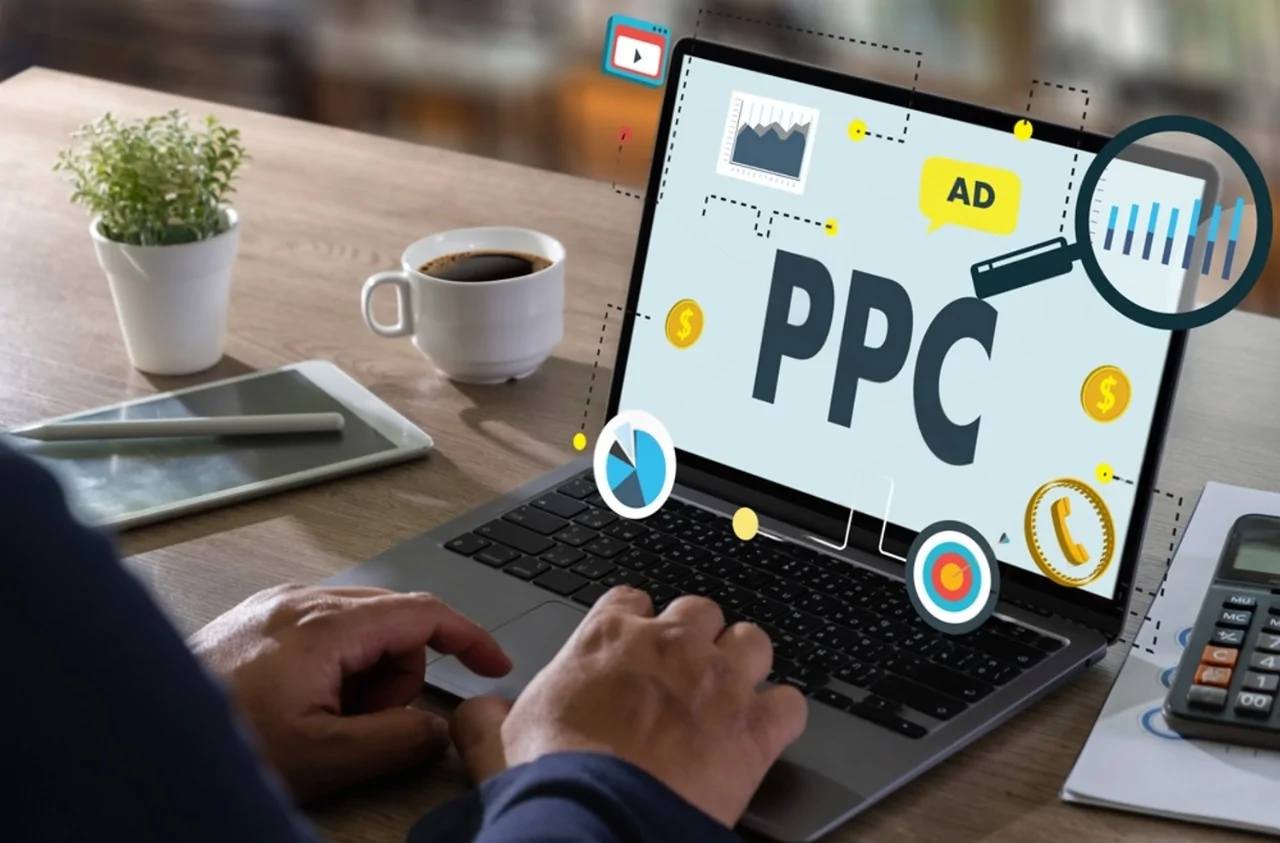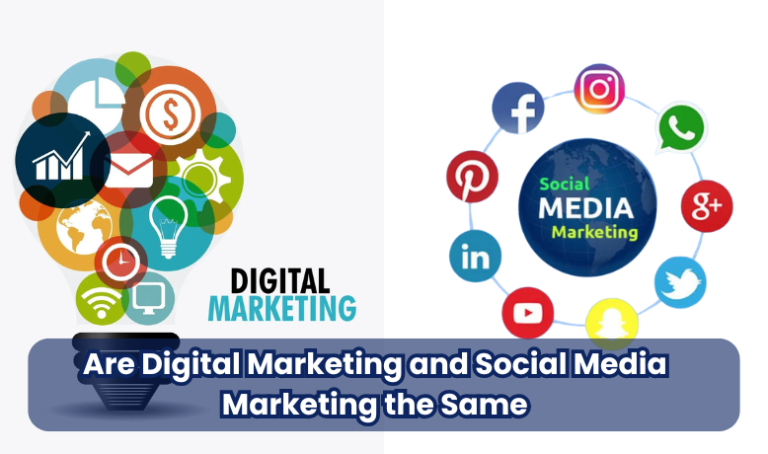In the fast-evolving world of online branding, one question remains among business owners and marketers: Are digital marketing and social media marketing the same? Many people use these terms interchangeably, assuming they represent identical strategies. In contrast, they do overlap in some areas, and treating them as the same can lead to gaps in your overall marketing approach.
Digital marketing refers to a broad umbrella of strategies used to promote products or services through various online channels such as search engines, websites, emails, and paid advertisements. On the other hand, social media marketing focuses specifically on building brand awareness and engagement through social networking platforms like Facebook, Instagram, Twitter, and LinkedIn.
Table of Contents
ToggleWhat is Digital Marketing?

Digital marketing is a comprehensive term encompassing all marketing efforts conducted through digital channels. It involves using the internet and electronic devices to promote products, services, or brands, aiming to connect with consumers in real time, across multiple platforms.
Digital marketing is about delivering the right message to the right audience through the right channel. It goes beyond social media and includes many strategies and tools that help businesses build visibility, generate leads, and drive conversions.
Key Channels of Digital Marketing Include:
- Search Engine Optimisation (SEO): Boosts your website’s visibility on search engines like Google to attract organic traffic.
- Pay-per-click advertising (PPC) involves running paid ads on platforms like Google Ads to drive targeted traffic instantly.
- Email Marketing: Sends personalised emails to prospects and customers for promotions, updates, or nurturing relationships.
- Content Writing: Uses blogs, videos, infographics, and guides to provide value and build brand authority.
- Affiliate Marketing: Partners with third-party individuals or companies to promote your services for a commission.
- Mobile Marketing: Engages users via SMS, push notifications, and mobile-optimised ads.
What is Social Media Marketing?

Social media marketing (SMM) is a focused branch of digital marketing that involves creating and sharing content on social networking platforms to achieve branding, marketing, and communication goals. It revolves around connecting with audiences where they spend most of their online time—on social media.
Unlike broader digital marketing efforts, SMM is platform-specific and relies heavily on interaction, storytelling, and real-time engagement. Popular platforms include:
- Facebook – Ideal for building communities and running targeted ad campaigns.
- Instagram – A visual-centric space perfect for lifestyle branding, influencers, and product showcases.
- Twitter (now X) – Best for real-time updates, customer service, and public conversations.
- LinkedIn – A professional hub for B2B marketing, thought leadership, and networking.
- TikTok – A rising star in video-based engagement, ideal for short-form storytelling and viral trends.
Key strategies in social media marketing include:
- Content Creation: Designing platform-tailored posts, stories, and videos that reflect your brand personality.
- Engagement: Responding to comments, joining discussions, and encouraging user-generated content to build loyalty.
- Community Building: Creating a loyal follower base that interacts with your brand and amplifies its message.
The core objectives of social media marketing are to enhance brand awareness, foster two-way communication, and build authentic relationships with your audience. Social media thrives on human connection and instant feedback, making it a powerful tool for brand storytelling and trust-building.
How Do They Complement Each Other?
Rather than competing, digital and social media marketing complement each other, forming a more complete and effective online strategy. When used together, they create an integrated marketing ecosystem that simultaneously supports awareness, engagement, and conversion.
Importance of Integrated Campaigns
An integrated campaign ensures that all digital efforts—whether on social platforms, search engines, email, or websites—work toward the same business goals. It aligns your messaging across every touchpoint, reinforcing your brand and improving customer trust.
For instance, a business might launch a new product campaign across multiple digital channels:
- Social media to spark interest and generate buzz.
- PPC ads to capture high-intent search traffic.
- A landing page to drive sign-ups or purchases.
- An email sequence to follow up with leads and encourage repeat engagement.
Example: PPC + Social Ads for Lead Generation

Imagine you’re promoting an online course. Running Google Ads (PPC) targets users actively searching for similar courses, while Facebook or Instagram ads generate interest from users who match your target profile but aren’t actively searching yet. Together, these strategies widen your lead pool and accelerate conversions.
Email Campaigns Supported by Social Engagement
A well-timed email campaign can remind your audience about an offer or announcement—but pairing it with social posts keeps the message visible in multiple places. For example, promoting a webinar through email and reinforcing it with countdown posts on social media boosts attendance and user interaction.
Which One is Right for Your Business?
Choosing between digital marketing services and social media marketing isn’t about picking a winner—it’s about understanding what works best for your business at its current stage. The right approach depends on several key factors that shape your overall marketing direction:
Target Audience

Start by asking: Where does your audience spend time online?
- If your audience frequently searches for products, reads blogs, or uses email, a broader digital marketing strategy with SEO and content marketing may be more effective.
- Social media marketing becomes essential for engagement and brand presence if your audience is highly active on platforms like Instagram, Facebook, or LinkedIn.
Budget
Your budget influences both your strategy and your expectations.
- Digital marketing channels like PPC or email automation may require higher upfront investment, but often deliver direct ROI through measurable conversions.
- Social media marketing can be more cost-effective for small businesses, especially when leveraging organic content and community growth before scaling into paid ads.
Business Goals
Your choice also depends on what you’re trying to achieve:
- If your goal is lead generation, website traffic, or sales, then a digital strategy using SEO, PPC, and landing pages is ideal.
- If you focus on brand awareness, engagement, or building an online community, social media marketing provides a more interactive and visible path.
Frequently Asked Questions
Is social media marketing part of digital marketing?
Yes, social media marketing is a subset of digital marketing. It focuses specifically on platforms like Facebook, Instagram, Twitter, and LinkedIn, while digital marketing includes a wider range of channels such as email marketing, SEO, PPC, and more.
Can I use social media marketing alone?
You can, especially if your target audience is highly active on social platforms. However, using social media alone may limit your reach and conversion potential. A more balanced approach that includes SEO or email marketing often delivers better long-term results.
Which is better for small businesses?
It depends on your goals and audience. Social media marketing is often easier due to its lower cost and high visibility. However, for sustainable growth, combining it with digital marketing tactics like local SEO or email campaigns can maximise ROI for small businesses.
Does SEO fall under digital marketing?
Absolutely. Search Engine Optimisation (SEO) is one of the core components of digital marketing. It helps increase your website’s visibility on search engines, driving organic traffic and improving your online presence.

